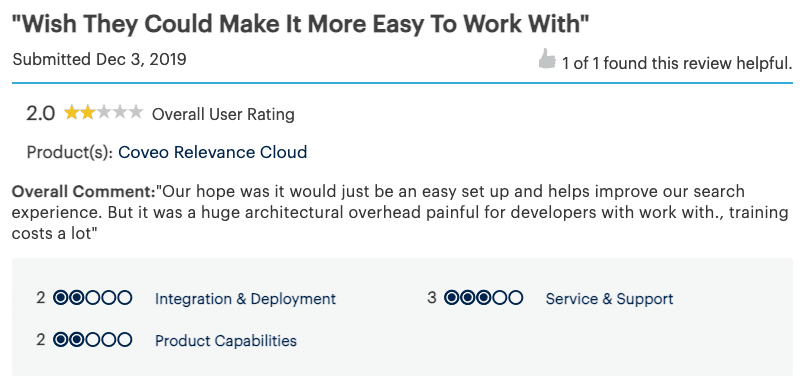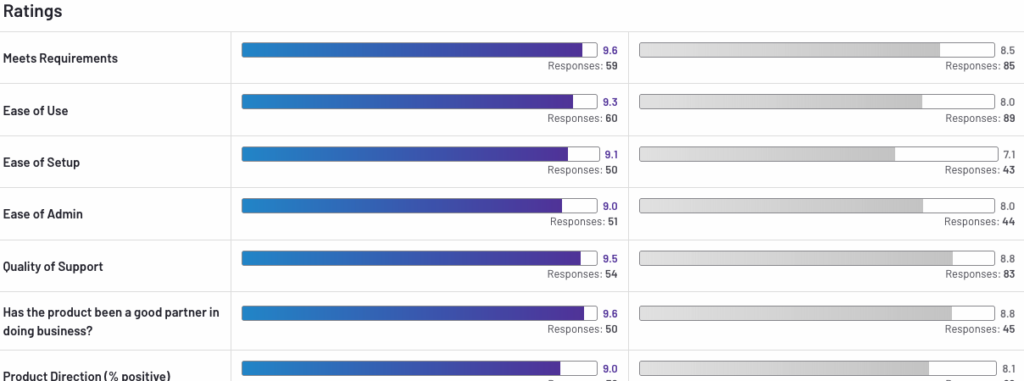Introduction
In the rapidly transforming digital landscape, the selection of an appropriate site search platform transcends mere technicality; it’s a strategic imperative that significantly influences user experience and overall business success. This detailed exploration provides an in-depth comparison between two frontrunners in the site search domain: AddSearch and Coveo. Our analysis is rooted in genuine user feedback, comprehensive case studies, and a nuanced understanding of the elements that distinguish an exceptional site search solution.
The Coveo Conundrum: Navigating Business Challenges
Coveo, a recognized entity in the site search market, has faced critical scrutiny due to several emerging challenges:
- Cost Concerns and Support Gaps: Coveo’s pricing model has been a topic of debate, especially among smaller enterprises. Users have reported dissatisfaction with the support quality, an essential component of any technological infrastructure.
- Technical Hurdles: The platform’s inherent complexity demands substantial technical expertise, creating barriers for teams with limited IT resources. The additional cost for product training, often steep, exacerbates this issue.

- Integration and Stability Woes: Users have encountered difficulties when integrating Coveo with other systems, such as chatbots. The platform’s preview environment has also been criticized for its instability, leading to user dissatisfaction.
- Indexing Delays in E-commerce: In the dynamic realm of e-commerce, Coveo’s delay in indexing new products, sometimes extending to six hours, poses a significant challenge.
- Limited Data Insights: The platform’s capabilities in reporting and data visualization are perceived as subpar, hindering effective data-driven decision-making.
The AddSearch Advantage: A Nintex Case Study
In stark contrast, AddSearch emerges as a more user-friendly and efficient alternative. The experience of Nintex, a pioneer in process management and automation, underscores the advantages of AddSearch:
- Ease of Implementation and Support: Known for its straightforward setup and proactive support, AddSearch is particularly suited for businesses with limited technical infrastructure.
- Flexibility and User-Centric Design: The platform’s intuitive design is tailored to meet the needs of both technical and non-technical users, a vital aspect for rapidly adapting businesses.
- Real-Time Indexing and Maintenance: AddSearch’s capability for immediate indexing is essential for websites with frequent content updates.
- Customization and Advanced Features: The platform offers a range of customizable options, including custom fields, synonyms, and API integration, enabling businesses to create a tailored search experience.
- Enhanced User Engagement: AddSearch’s sophisticated tools for ranking and cross-search results significantly enhance the user search experience, leading to increased engagement and satisfaction.
Choosing AddSearch Over Coveo: The Deciding Factors
AddSearch distinguishes itself for several compelling reasons:
- Cost-Effectiveness: It presents an affordable solution, particularly advantageous for smaller businesses or those with limited budgets.
- User Accessibility: The platform’s user-centric design makes it suitable for a wide array of teams and skill levels.
- Exceptional Customer Support: The high level of customer support offered by AddSearch is a notable advantage.
- Customization and Flexibility: The ability to customize the search experience to meet specific business needs is a key feature of AddSearch.
- Timely Content Updates: The platform’s commitment to ensuring content is always current is crucial for maintaining an effective online presence.
Furthermore, according to G2, a leading software comparison website, AddSearch outperforms Coveo based on a survey conducted with over 140 users.

Experience the Best in Search Solutions with AddSearch – Top Rated on SourceForge! Click for Your Free, Personalized Demo Now.

Deep Dive: Analyzing User Feedback and Market Trends
To further substantiate our comparison, we delved into extensive user reviews and market analyses. This involved examining various aspects such as ease of use, scalability, integration capabilities, and overall customer satisfaction. Our research revealed that AddSearch consistently scores higher in user-friendliness and scalability, making it a preferred choice for businesses looking to grow and adapt in the digital age.
The Future of Site Search: Embracing Innovation with AddSearch
As we look towards the future, the importance of innovative and adaptable site search solutions becomes increasingly evident. AddSearch, with its commitment to continuous improvement and embracing new technologies, positions itself as a forward-thinking leader in this space. Its ability to integrate with emerging digital trends and platforms ensures that businesses using AddSearch stay ahead of the curve.
Conclusion: AddSearch – A Strategic Choice for Today’s Digital Needs
In an era where user experience is paramount, the right site search solution is a critical component of digital strategy. While Coveo offers certain advantages, its challenges in terms of affordability, complexity, and support are significant. AddSearch, with its user-friendly interface, customizable features, and outstanding support, represents a compelling alternative for modern digital requirements.
For businesses aiming to enhance their online presence with an efficient, cost-effective site search solution, AddSearch emerges as a formidable contender. Its alignment with current digital trends, coupled with its robust feature set and customer-centric approach, makes it an ideal choice for businesses striving to excel in the digital landscape.



